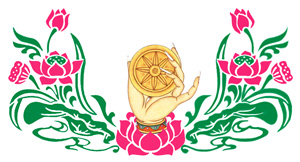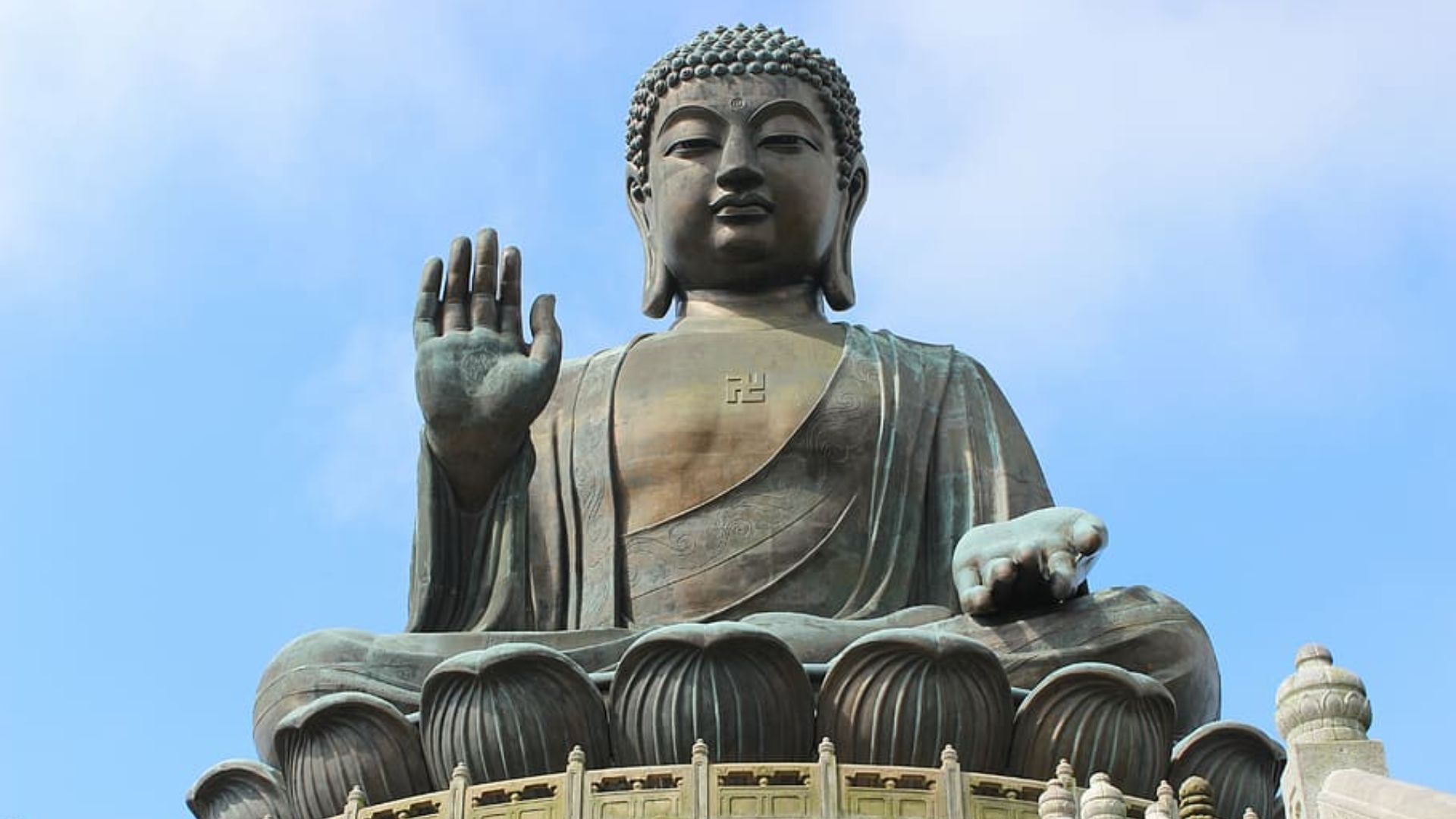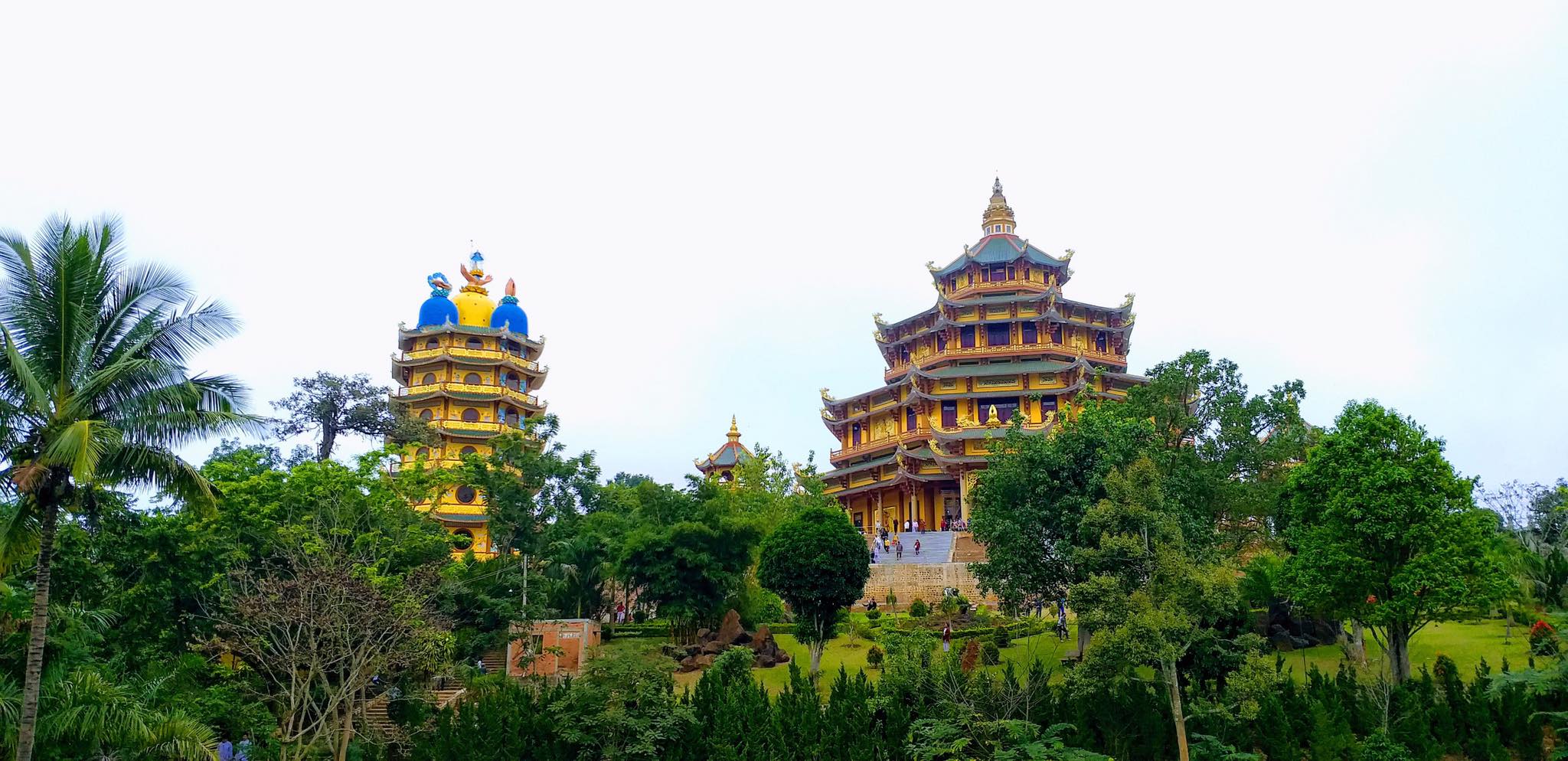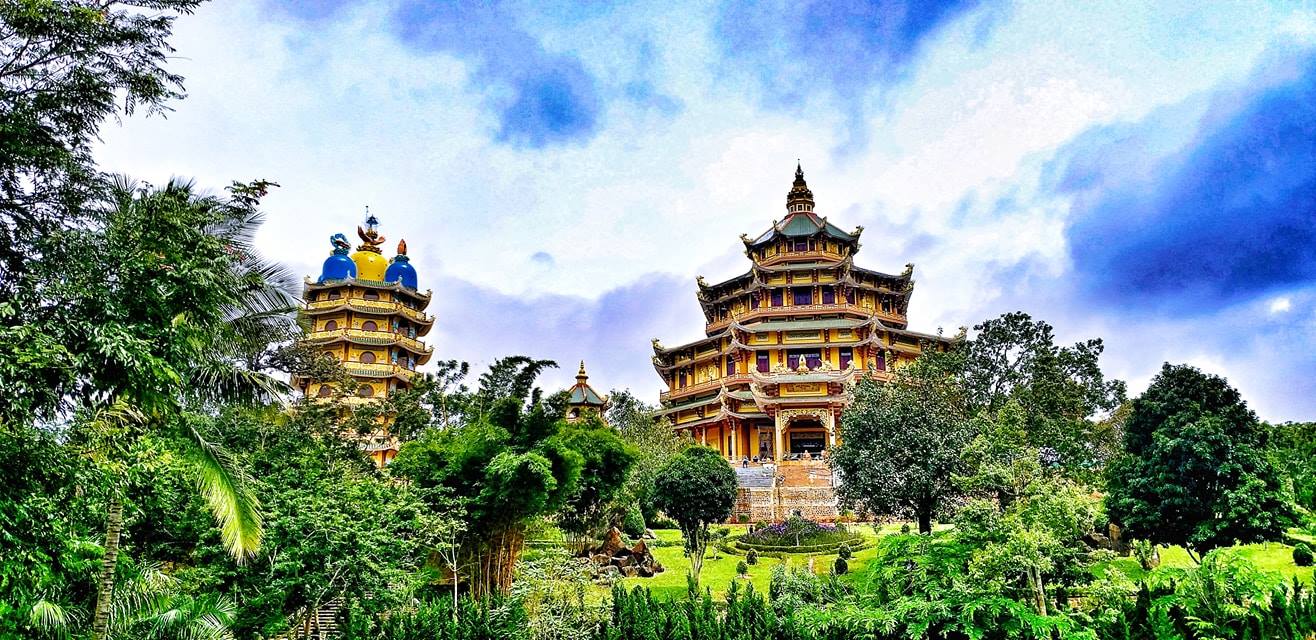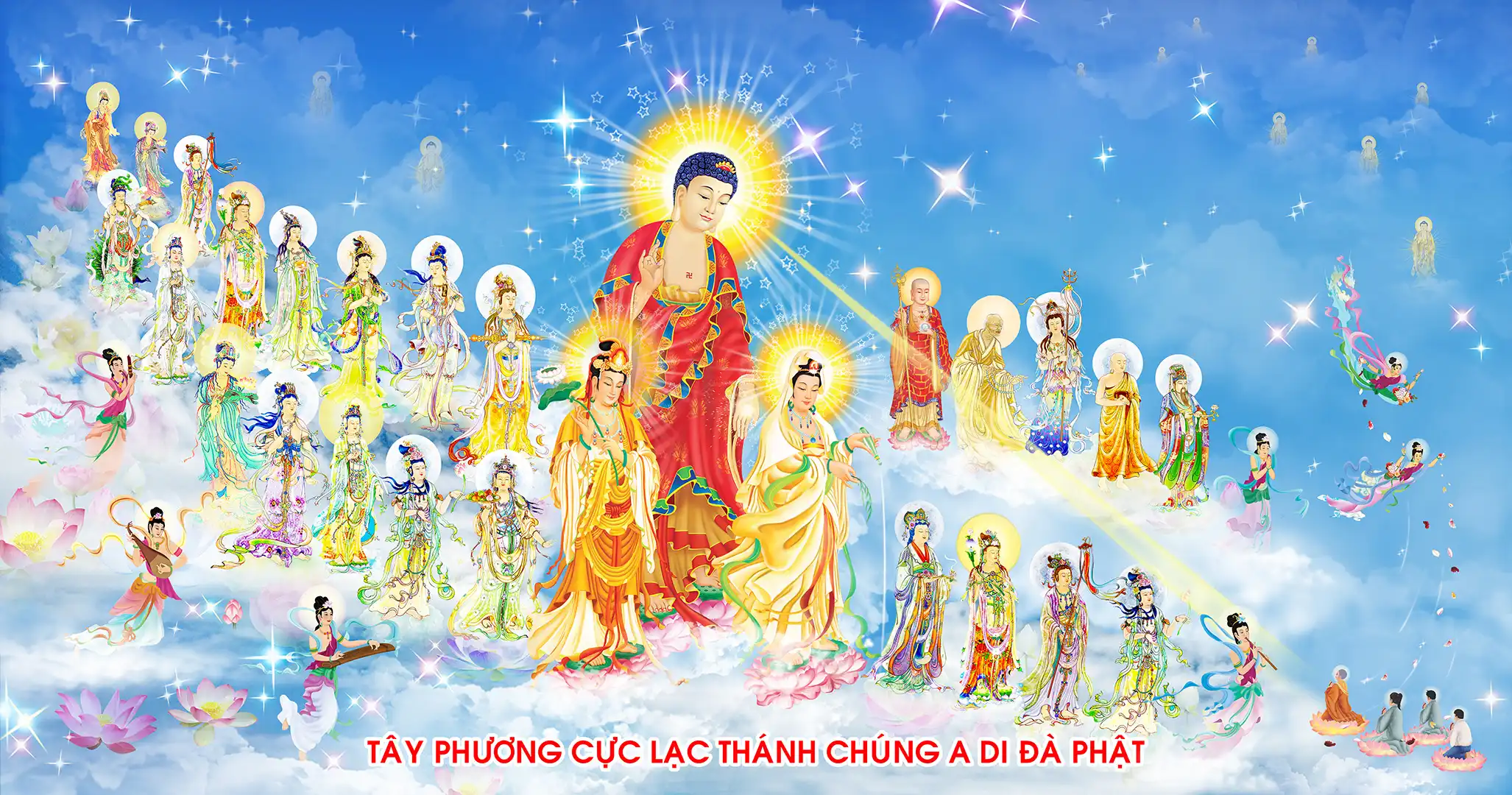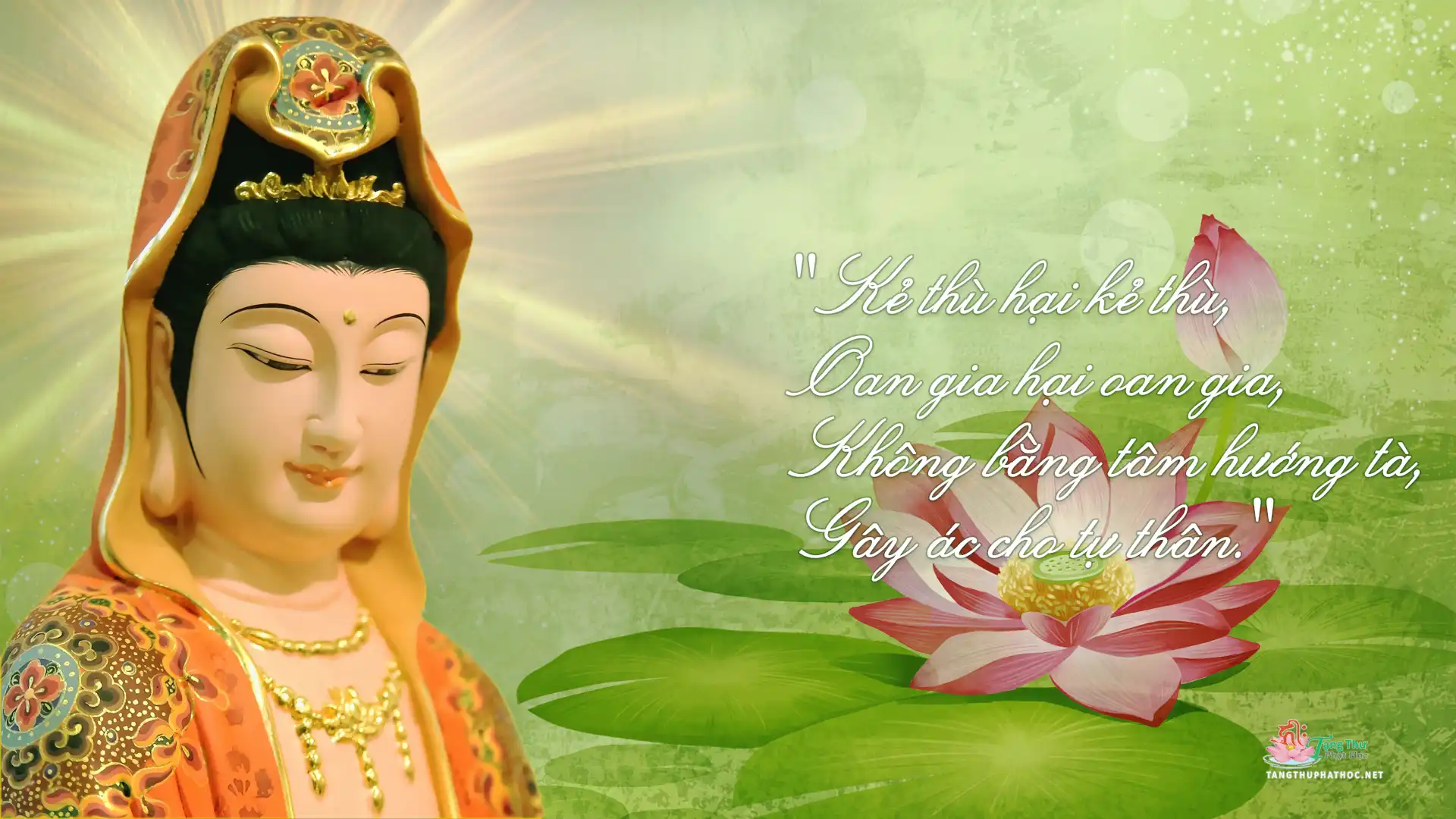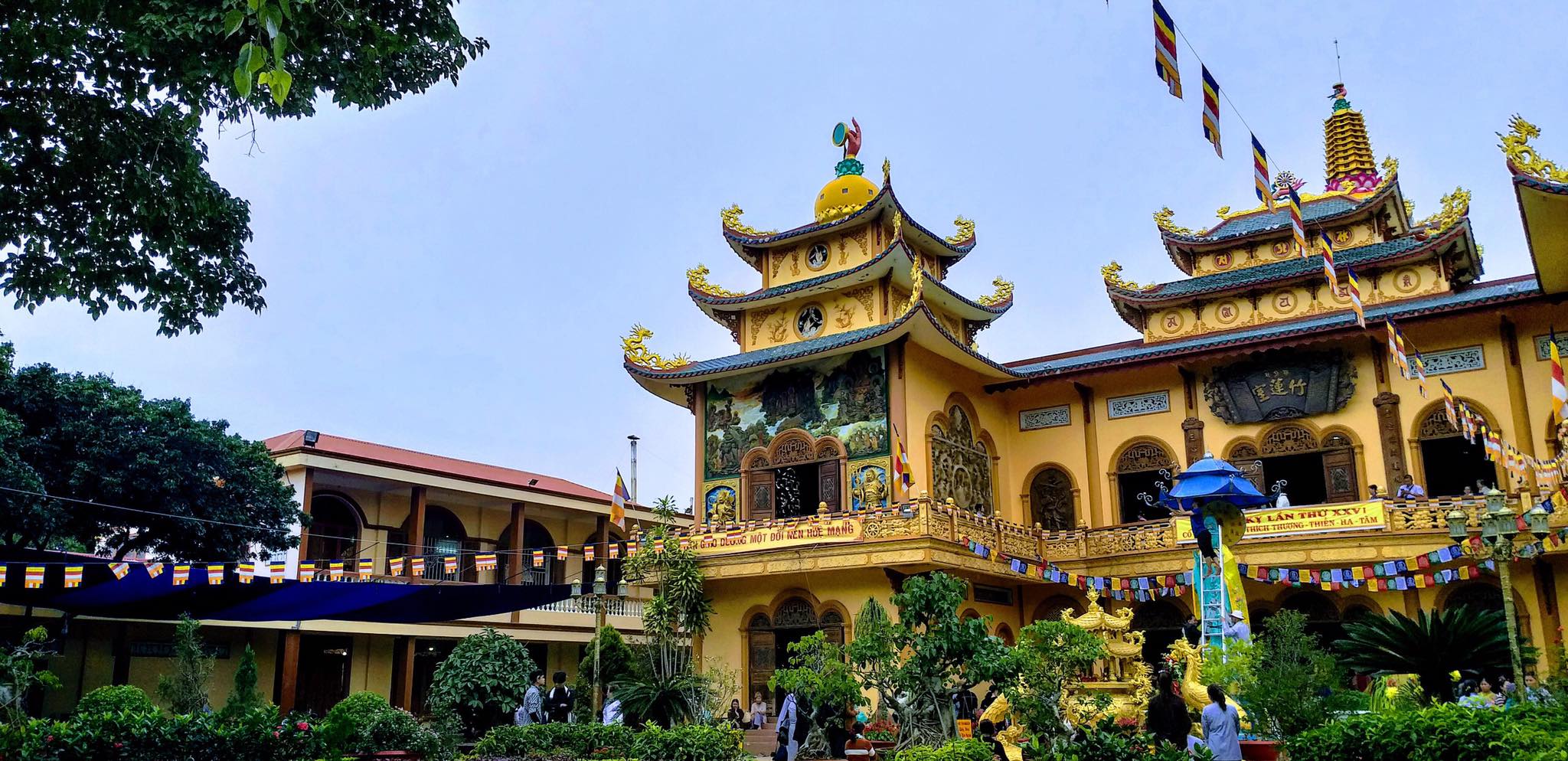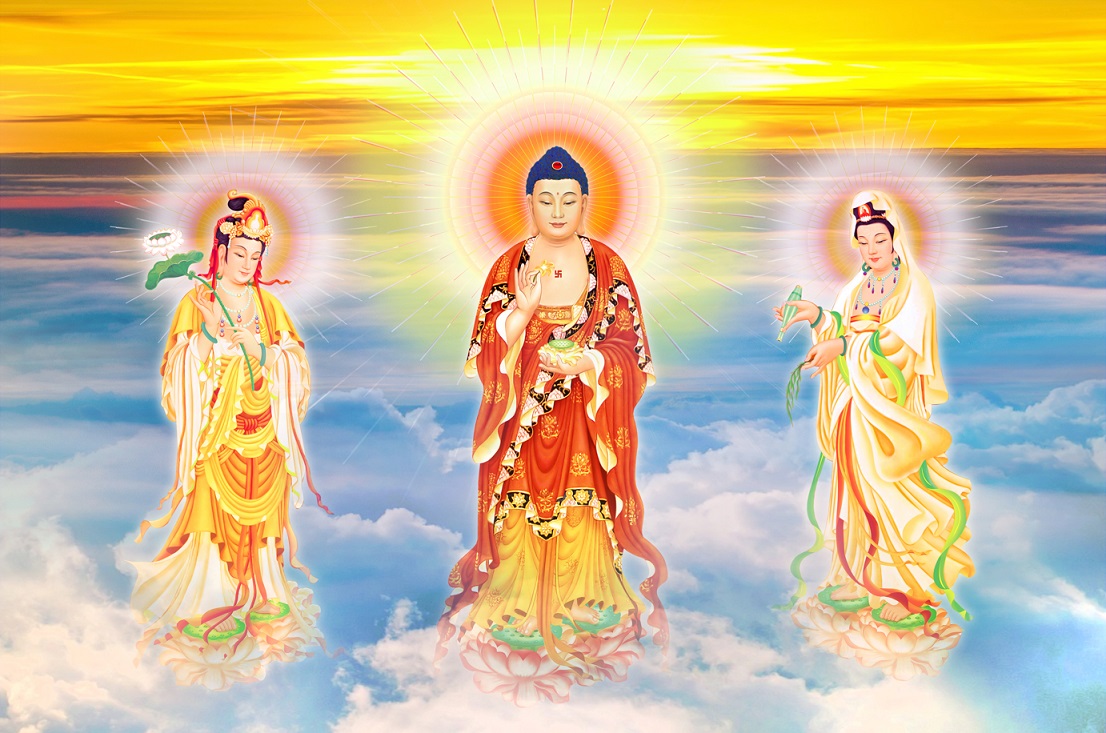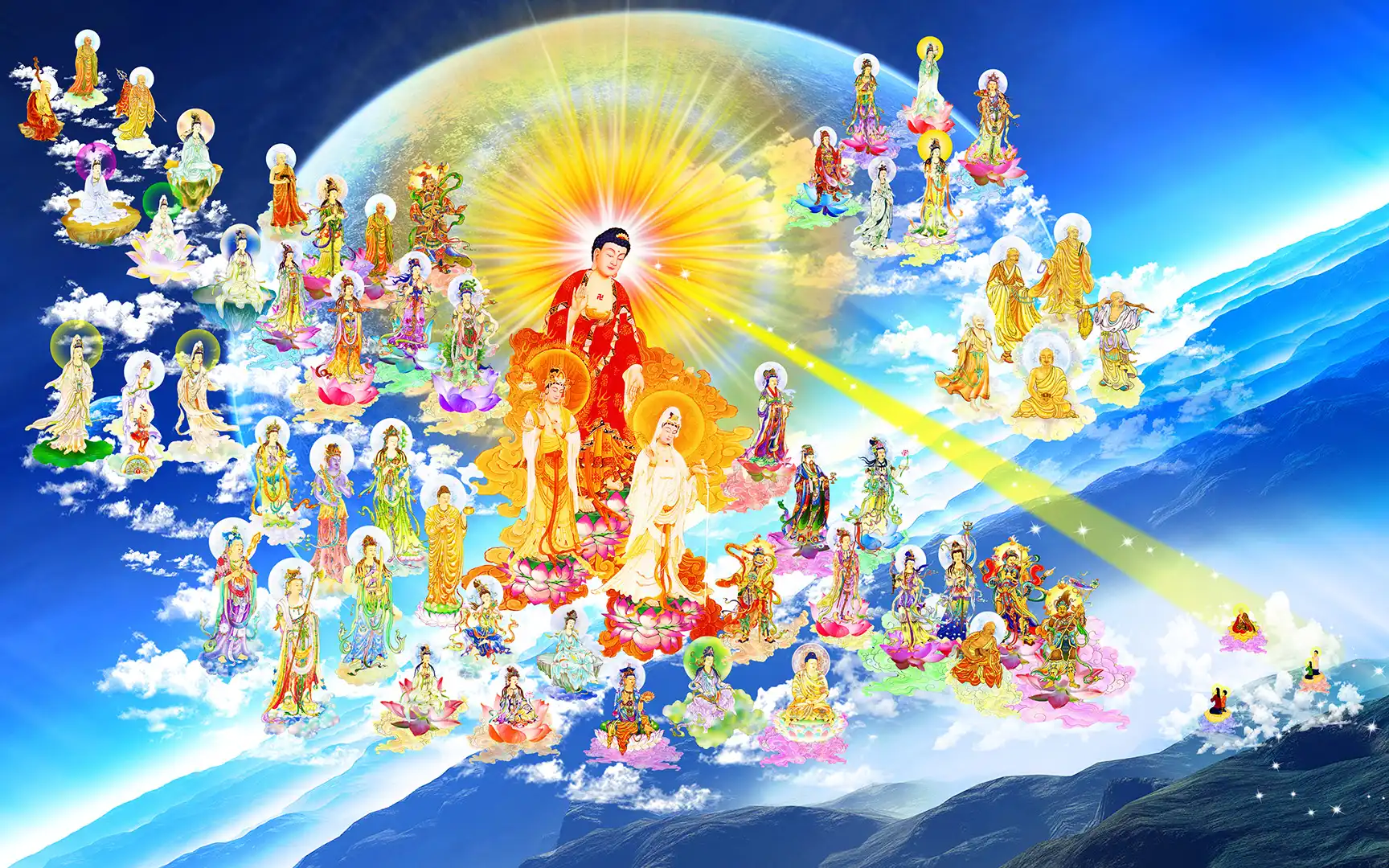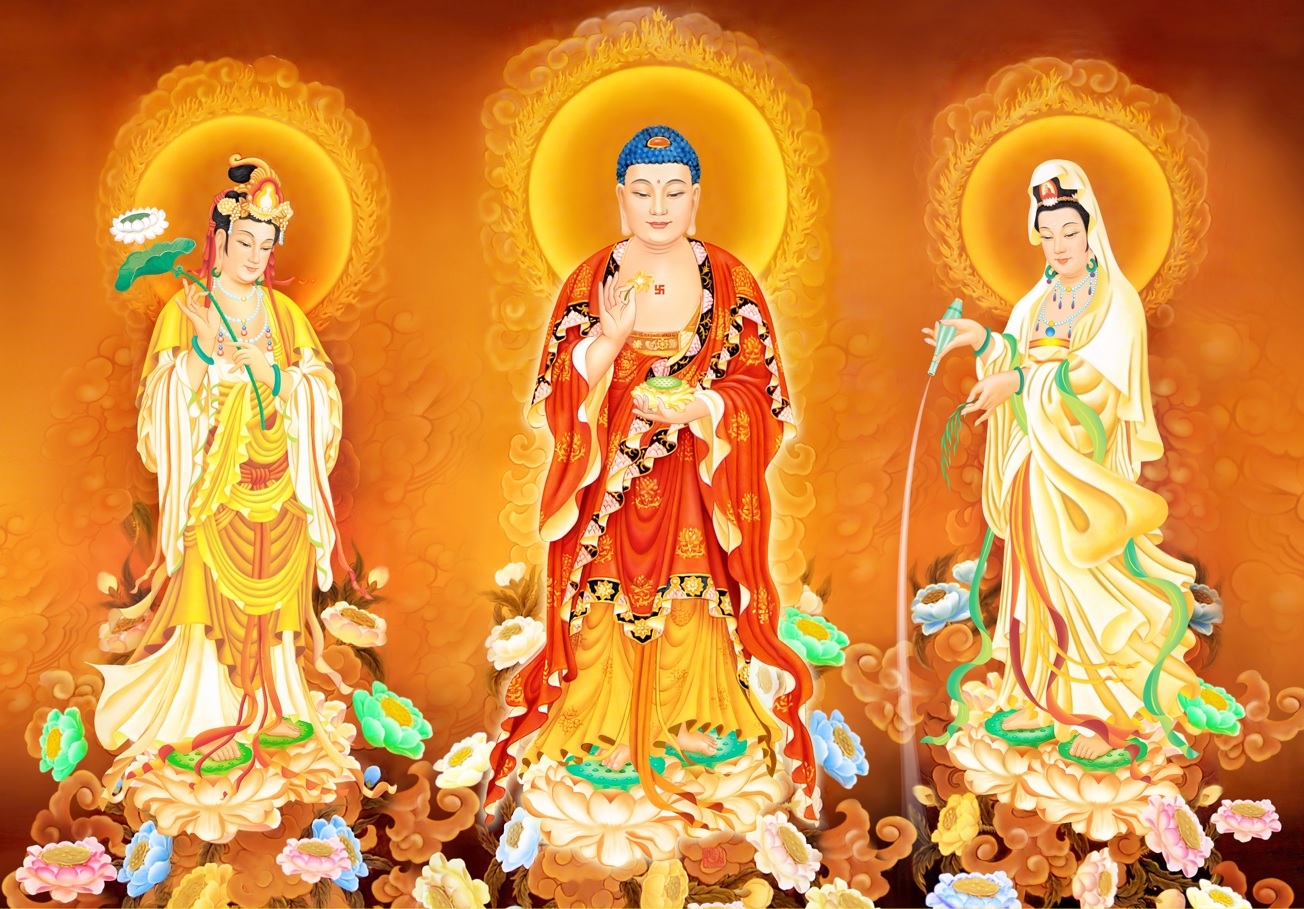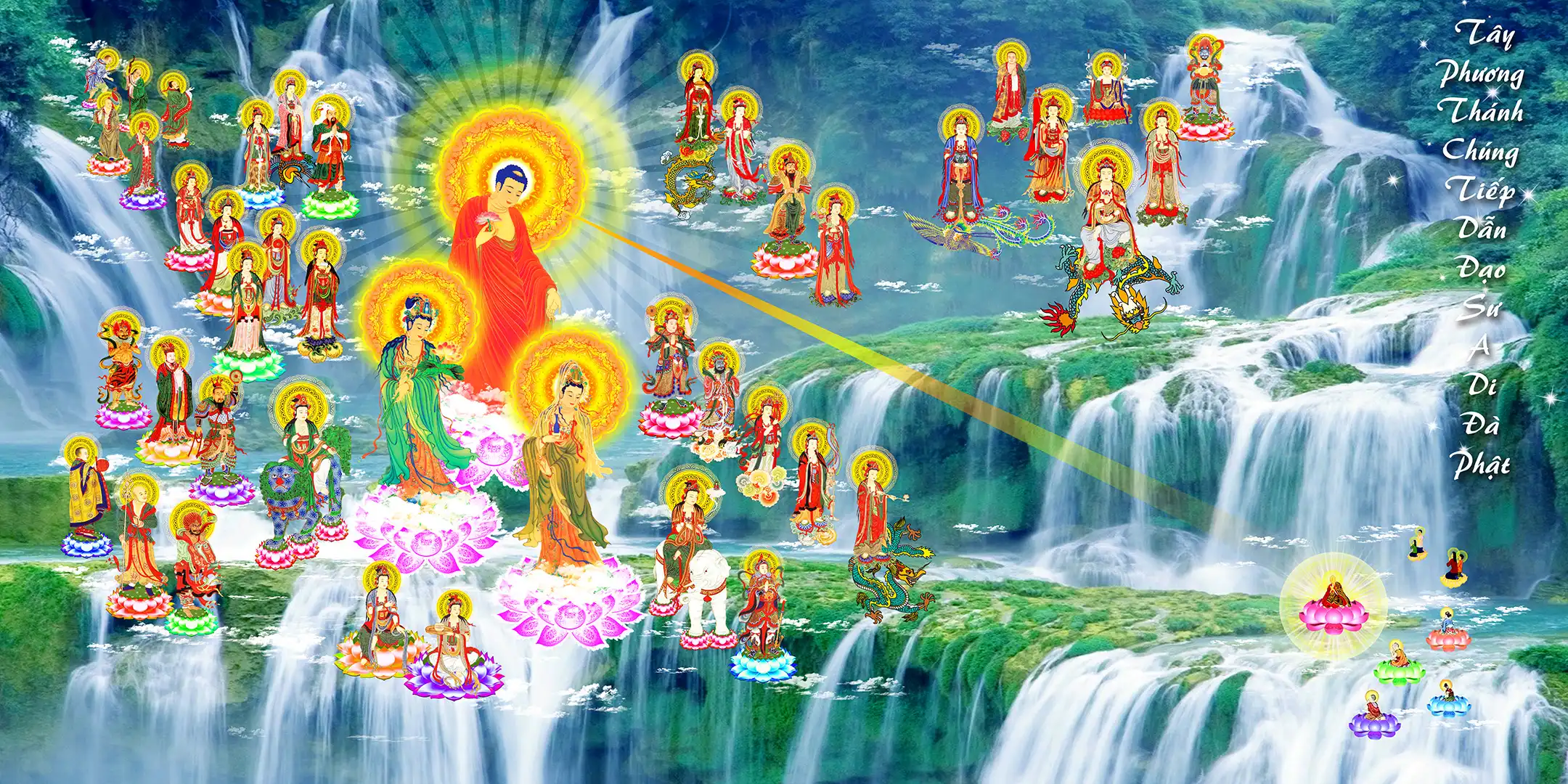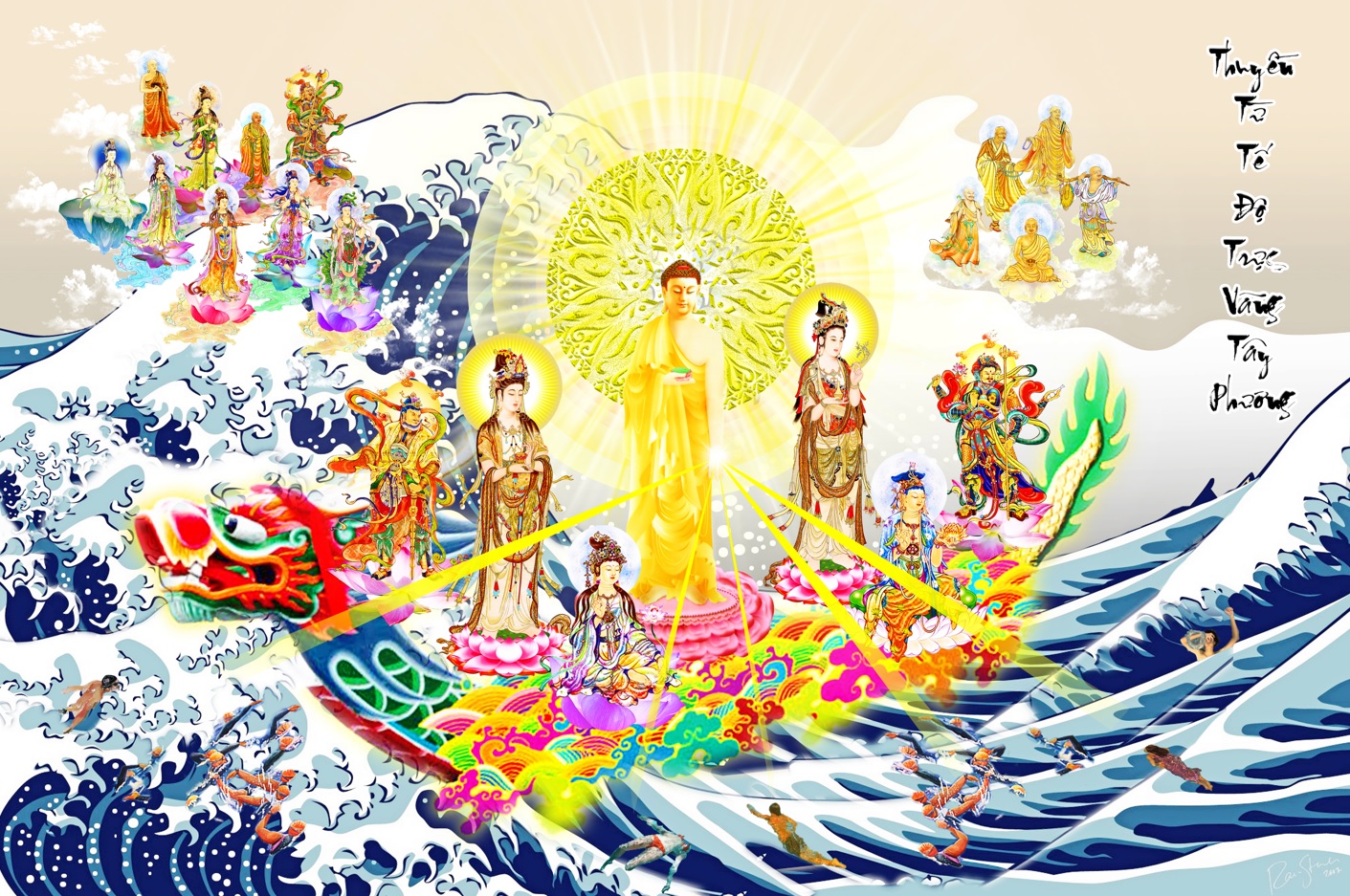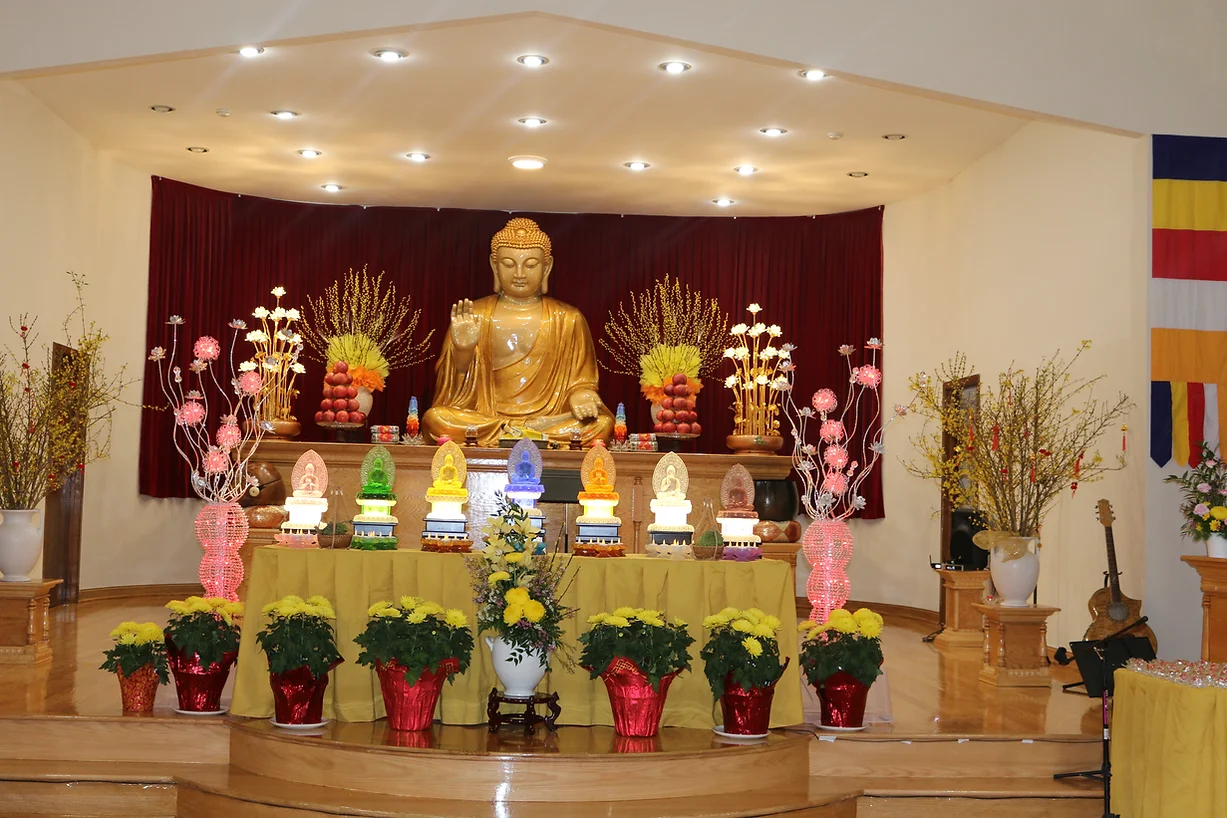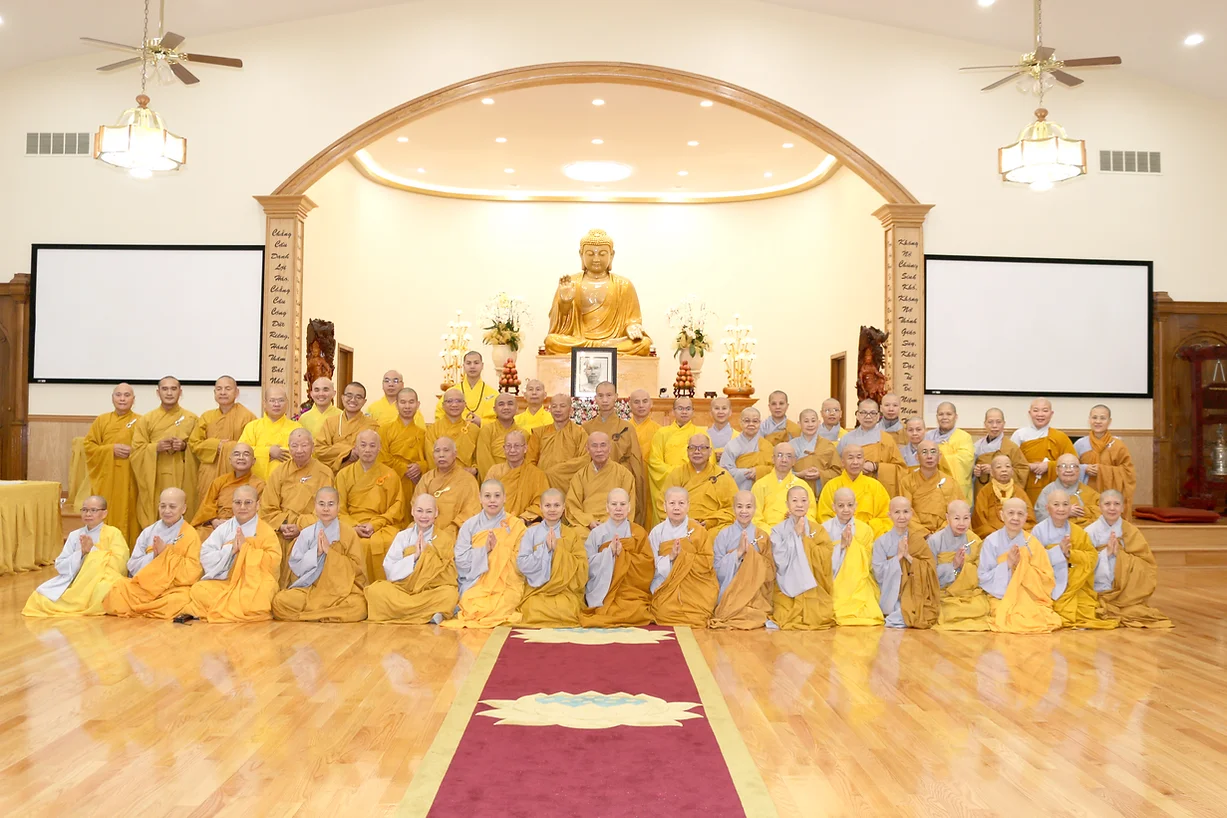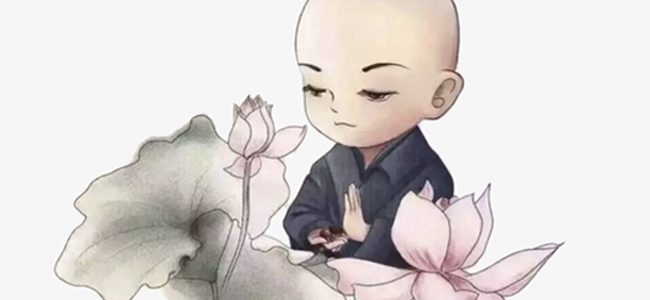Tổ Đình Minh Đăng Quang
PHẬT HỌC TỪ ĐIỂN – BUDDHIST DICTIONARY
Thiện Phúc
PHỤ LỤC (APPENDICES)
PHỤ LỤC F – Appendix F
Kinh Pháp Bảo Ðàn
The Jewel Platform Sutra
Phẩm Thứ Sáu—Sám Hối—The Sixth Chapter—Repentance and Reform
Khi ấy Tổ thấy sĩ thứ bốn phương từ Quảng Châu , Thiều Châu đua nhau đến trong núi nghe pháp, Tổ mới đăng tòa bảo chúng rằng: “Ðến đây, các thiện tri thức! Tánh nầy phải từ trong tự tánh mà khởi, trong tất cả thời, mỗi niệm tự tịnh tâm kia, tự tu, tự hành, thấy pháp thân của mình, thấy tâm Phật của mình, tự độ, tự giới mới được, không nhờ đến đây. Ðã từ xa đến, một hội ở đây đều cùng có duyên, nay có thể mỗi vị quỳ gối, trước tôi vì truyền cho Tự Tánh Ngũ Phần Pháp Thân Hương, kế đó là trao Vô Tướng Sám Hối—Seeing the scholars and common people of Kuang-Chou and Shao-Kuan and the four directions assembled on the mountain to hear the Dharma, the Great Master took his seat and spoke to the assembly saying: “Come, each of you, Good Knowing Advisors! This work must begin within your self-nature. At all times, in every thought, purify your mind, cultivate your own conduct, see your own Dharm-body and the Buddha of your own mind. Take yourself across; discipline yourself. Only then will your coming here have not been in vain. You have come from afar to attend this gathering because we have karmic affinities in common. Now all of you kneel and I will first transmit to you the fivefold Dharma-body refuge of the self-nature, and then the markless repentance and reform.”
Chúng đều quỳ gối, Tổ bảo: “Một là giới hương, tức là trong tâm mình không có quấy, không có ác, không tật đố, không tham sân, không cướp hại, gọi là giới hương. Hai là định hương, tức là thấy các cảnh tướng thiện ác mà tự tâm chẳng loạn gọi là định hương. Ba là huệ hương, tức là tâm mình không ngại, thường dùng trí huệ quán chiếu tự tánh, chẳng tạo các ác, tuy tu các hạnh lành mà tâm không chấp trước, kính bậc trên thương kẻ dưới, cứu giúp người cô bần, gọi là huệ hương. Bốn là giải thoát hương, tức là tự tâm mình không có chỗ phan duyên, chẳng nghĩ thiện, chẳng nghĩ ác, tự tại vô ngại gọi là giải thoát hương. Năm là giải thoát tri kiến hương, tức là tự tâm đã không có chỗ phan duyên thiện ác, không thể trầm, không trệ tịch, tức phải học rộng nghe nhiều, biết bản tâm mình, đạt được lý của chư Phật, hòa quang tiếp vật, không ngã không nhơn, thẳng đến Bồ Ðề, chơn tánh không đổi, gọi là giải thoát tri kiến hương. Nầy thiện tri thức! Hương nầy mỗi người tự huân ở trong, chớ hướng ra ngoài tìm cầu, nay tôi vì các ông mà trao ‘Vô Tướng Sám Hối’ để diệt tội trong ba đời, khiến được ba nghiệp thanh tịnh. Nầy thiện tri thức! Mỗi người đồng thời nói theo lời tôi: “Ðệ tử chúng con, từ niệm trước, niệm hiện tại và niệm sau, mỗi niệm không bị ngu mê làm nhiễm, từ trước có những nghiệp ác, ngu mê, vân vân, các tội thảy đều sám hối, nguyện một lúc tiêu diệt, hằng không khởi lại. Ðệ tử chúng con, từ niệm trước, niệm hiện nay và niệm sau, mỗi niệm không bị kiêu cuống làm nhiễm, từ trước có những nghiệp ác, kiêu cuống, vân vân, các tội thảy đều sám hối, nguyện một thời tiêu diệt, hằng không khởi lại. Ðệ tử chúng con, từ niệm trước, niệm hiện nay và niệm sau, mỗi niệm không bị tật đố làm nhiễm, từ trước đó có những nghiệp ác, tật đố, vân vân, các tội thảy đều sám hối, nguyện một lúc tiêu diệt, hằng không khởi lại. Nầy thiện tri thức! Về trước là ‘Vô Tướng Sám Hối.’ Thế nào gọi là sám? Thế nào gọi là hối? Sám là sám những lỗi về trước, từ trước có những nghiệp ác ngu mê, kiêu cuống, tật đố, vân vân, các tội thảy đều sám hết, hằng không khởi lại, gọi đó là sám. Hối là hối những lỗi về sau, từ nay về sau có những nghiệp ác ngu mê, kiêu cuống, tật đố, vân vân, các tội nay đã giác ngộ, thảy đều hằng đoạn, lại không tạo lại, ấy gọi là hối, nên gọi là sám hối. Người phàm phu ngu mê, chỉ biết sám lỗi trước, chẳng biết hối lỗi sau, do vì không hối nên tội trước chẳng diệt, lỗi sau lại sanh. Tội trước đã chẳng diệt, lỗi sau lại sanh, sao gọi là sám hối được—The assembly knelt and the Master said, “The first is the morality-refuge, which is simply your own mind when free from error, evil, jealousy, greed, hatred and hostility. The second is the concentration-refuge, which is just your own mind and does not become confused when seeing the marks of all good and evil conditions. The third is the wisdom-refuge, which is simply your own mind when it is unobstructed and when it constantly uses wisdom to contemplate and illuminate the self-nature, when it does no evil, does good without becoming attached and, is respectful of superior, considerate of inferiors, and sympathetic towards orphans and widows. The fourth is the liberation-refuge, which is simply your own mind independent of conditions, not thinking of good or evil, free and unobstructed. The fifth is the refuge of knowledge and views, which is simply your own mind when it is independent of good and evil conditions and when it does not dwell in emptiness or cling to stillness. You should then study this in detail, listen a great deal, recognize your original mind and penetrate the true principle of all the Buddhas. You should welcome and be in harmony with living creatures; the unchanging true nature. Good Knowing Advisors, the incense of these refuges perfumes each of you within. Do not seek outside. I will now transmit to you the markless repentance and reform to destroy the offensive actions done within the three periods of time and to purify the three karmas. Good Knowing Advisors, repeat after me: “May this disciple be, in past, present, and future thought, in every thought, unstained by stupidity and confusion. May it be wiped away at once and never arise again. May this disciple be, in past, present, and future thought, in every thought, unstained by ignorance and deceit. Now I Completely repent of and reform all bad actions done in the past out of arrogance and deceit and other such offenses. May their effects be wiped away at once and may never be perpetrated again. May this disciple be in past, present, and future thought, in every thought unstained by jealousy. Now I completely repent and reform all bad actions done in the past out of jealousy and other such offenses. May they be wiped away at once and never arise again. Good Knowing Advisors, the above has been the markless repentance and reform. What is repentance and what is reform? Repentance is to repent of past errors, to repent so completely of all bad actions done in the past out of stupidity, confusion, arrogance, deceit, jealousy, and other such offenses, that they never arise again. Reform is to refrain from such transgressions in the future. Awakening and cutting off such offenses completely and never committing them again is called repentance and reform. Common people, stupid and confused, know only how to repent of former errors and do not know how to reform and refrain from transgressions in the future. Because they do not reform, their former errors are not wiped away, and they will occur in the future. If former errors are not wiped away and transgressions are again committed, how can that be called repentance and reform?”
Nầy thiện tri thức! Ðã sám hối xong, vì thiện tri thức, phát tứ hoằng thệ nguyện, mỗi người phải dụng tâm chánh lắng nghe: “Tự tâm chúng sanh vô biên thệ nguyện độ, tự tâm phiền não vô biên thệ nguyện đoạn, tự tánh pháp môn vô tận thệ nguyện học, tự tánh Vô Thượng Phật đạo thệ nguyện thành.” Nầy thiện tri thức! Cả thảy đâu chẳng nói: “Chúng sanh vô biên thệ nguyện độ, nói thế ấy, vả lại không phải là Huệ Năng độ.” Nầy thiện tri thức! Chúng sanh trong tâm, chỗ gọi rằng tâm tà mê, tâm cuống vọng, tâm bất thiện, tâm tật đố, tâm ác độc, những tâm như thế trọn là chúng sanh, mỗi người nên tự tánh tự độ, ấy gọi là chơn độ. Sao gọi là tự tánh tự độ? Tức là trong tâm những chúng sanh tà kiến, phiền não, ngu si, mê vọng, đem chánh kiến mà độ. Ðã có chánh kiến bèn sử dụng trí Bát Nhã đánh phá những chúng sanh ngu si mê vọng, mỗi mỗi tự độ, tà đến thì chánh độ, mê đến thì ngộ độ, ngu đến thì trí độ, ác đến thì thiện độ, độ như thế gọi là chơn độ. Lại phiền não vô biên thệ nguyện đoạn, đem tự tánh Bát Nhã trí trừ hư vọng tư tưởng tâm ấy vậy. Lại pháp môn vô tận thệ nguyện học, phải tự thấy tánh của mình, thường hành chánh pháp, ấy gọi là chơn học. Lại vô thượng Phật đạo thệ nguyện thành, đã thường hay hạ tâm hành nơi chơn chánh, lìa mê, lìa giác, thường sanh Bát Nhã trừ chơn trừ vọng, tức thấy được Phật tánh, liền ngay nơi lời nói, liền thành Phật đạo, thường nhớ tu hành, ấy là pháp nguyện lực—Good Knowing Advisors, as you have repented and reformed, I will now teach you to make the four all-encompassing vows:
I vow to take across the limitless living beings of my own mind.
I vow to cut off the inexhaustible afflictions of my own mind.
I vow to study the immeasurable Dharma-doors of my own nature.
I vow to realize the supreme Buddha Way of my own nature.
Good Knowing Advisors, did all of you not just say, “I vow to take across the limitless beings? What does it mean? You should remember that it is not Hui-Neng who takes them across. Good Knowing Advisors, the ‘living beings’ within your mind are deviant and confused thoughts, deceitful and false thoughts, unwholesome thoughts, jealous thoughts, vicious thoughts: and these thoughts are ‘living beings’ The self-nature of each one of them must take itself across. That is true crossing over. What is meant by ‘the self-nature taking across?’ It is to take across by means of right views the living beings of deviant views, affliction, and delusion within your own mind. Once you have right views, use Prajna Wisdom to destroy the living beings of delusion, confusion, and falsehood. Each one takes itself across. Enlightenment takes confusion across, wisdom takes delusion across, goodness takes evil across. Such crossing over is a true crossing. Further, ‘I vow to cut off the inexhaustible afflictions.’ That is to use the Prajna Wisdom of your own self-nature to cast out the vain and false thoughts in your mind. Further, ‘I vow to study the immeasurable Dharma-door.’ You must see your own nature and always practice the right Dharma. That is true study. Further, ‘I vow to realize the supreme Buddha Way,’ and with humble mind to always practice the true and proper way. Separate yourself from both confusion and enlightenment, and always give rise to Prajna. When you cast out the true and the false, you see your nature and realize the Buddha-way at the very moment it is spoken of. Always be mindful; cultivate the Dharma that possesses the power of this vow.”
Nầy thiện tri thức! Nay phát tứ hoằng thệ nguyện rồi, tôi lại vì thiện tri thức mà trao ‘Vô Tướng Tam Quy Y Giới.’ Nầy thiện tri thức! Quy y giác lưỡng túc tôn, quy y chánh ly dục tôn, quy y tịnh chúng trung tôn. Từ ngày nay trở đi xưng ‘Giác’ làm thầy, lại chẳng quy y tà ma ngoại đạo, dùng tự tánh Tam Bảo thường tự chứng minh, khuyên thiện tri thức quy y tự tánh Tam Bảo. Phật là ‘Giác’ vậy, Pháp là ‘Chánh’ vậy, Tăng là ‘Tịnh’ vậy. Tự tâm quy y Giác, tà mê chẳng sanh, thiểu dục tri túc hay lìa tài sắc, gọi là Lưỡng Túc Tôn. Tự tâm quy y Chánh, niệm niệm không tà kiến, vì không tà kiến tức là không nhơn ngã cống cao, tham ái, chấp trước, gọi là Ly Dục Tôn. Tự tâm quy y Tịnh, tất cả cảnh giới trần lao ái dục, tự tánh đều không nhiễm trước, gọi là Chúng Trung Tôn. Nếu tu hạnh nầy, ấy là tự quy y. Phàm phu không hiểu, từ sáng đến tối, thọ tam quy giới, nếu nói quy y Phật, Phật ở chỗ nào? Nếu chẳng thấy Phật thì nương vào chỗ nào mà quy, nói lại thành vọng. Nầy thiện tri thức! Mỗi người tự quan sát, chớ lầm dụng tâm, kinh văn rõ ràng, nói tự quy y Phật, chẳng nói quy y với Phật khác, tự Phật mà chẳng quy, thì không có chỗ nào mà y được. Nay đã tự ngộ, mỗi người phải quy y tự tâm Tam Bảo, trong thì điều hòa tâm tánh, ngoài thì cung kính mọi người, ấy là tự quy y vậy—Good Knowing Advisors, now that you have made the four all-encompassing vows, I will transmit the precepts of the triple refuge that has no mark. Good Knowing Advisors, take refuge with the enlightened, the honored, the doubly complete. Take refuge with the right, the honored, that is apart from desire. Take refuge with the pure, the honored among the multitudes. ‘From this day forward, we call enlightenment our master and will never again take refuge with deviant demons or outside religions. We constantly enlighten ourselves by means of the Triple Jewel of our own self-nature.’ Good Knowing Advisors, I exhort you all to take refuge with the Triple Jewel of your own nature: the Buddha, which is enlightenment; the Dharma, which is right; and the Sangha, which is pure. When your mind takes refuge with enlightenment, deviant confusion does not arise. Desire decreases, so that you know contentment and are able to keep away from wealth and from the opposite sex. That is called the honored, the doubly complete. When your mind takes refuge with what is right, there are no deviant views in any of your thoughts because there are no deviant views; there is no self, other, arrogance, greed, love or attachment. That is called the honored that is apart from desire. When your own mind takes refuge with the pure, your self-nature is not stained by attachment to any state of defilement, desire or love. That is called the honored among the multitudes. If you cultivate this practice, you take refuge with yourself. Common people do not understand that, and so, from morning to night, they take the triple-refuge precepts. They say they take refuge with the Buddha, but where is the Buddha? If they cannot see the Buddha, how can they return to him? Their talk is absurd. Good Knowing Advisors, each of you examine yourselves. Do not make wrong use of the mind. The Avatamsaka Sutra clearly states that you should take refuge with your own Buddha, not with some other Buddha. If you do not take refuge with the Buddha in yourself, there is no one you can rely on. Now that you are self-awakened, you should each take refuge with the Triple Jewel of your own mind. Within yourself, regulate your mind and nature; outside yourself, respect others. That is to take refuge with yourself.”
Nầy thiện tri thức! Ðã quy y tự Tam Bảo xong, mỗi người phải chí tâm, tôi vì nói một thể ba thân tự tánh Phật, khiến các ông thấy được ba thân rõ ràng tự ngộ tự tánh. Phải theo lời tôi nói: “Nơi tự sắc thân quy y thanh tịnh pháp thân Phật, nơi tự sắc thân quy y viên mãn báo thân Phật, nơi tự sắc thân quy y thiên bá ức hóa thân Phật. Nầy thiện tri thức! Sắc thân là nhà cửa không thể quy y hướng đó, ba thân Phật ở trong tự tánh người đời thảy vì đều có, vì tự tâm mê không thấy tánh ở trong nên chạy ra ngoài tìm ba thân Như Lai, chẳng thấy ở trong thân có ba thân Phật. Các ông lắng nghe tôi nói khiến các ông ở trong tự thân thấy được tự tánh có ba thân Phật. Ba thân Phật nầy từ nơi tự tánh sanh, chẳng phải từ ngoài mà được. Sao gọi là Thanh Tịnh Pháp Thân Phật? Người đời bản tánh là thanh tịnh, muôn pháp từ nơi tánh mà sanh, suy nghĩ tất cả việc ác tức sanh hạnh ác, suy nghĩ tất cả việc lành tức sanh hạnh lành. Như thế các pháp ở trong tự tánh như trời thường trong, mặt trời mặt trăng thường sáng, vì mây che phủ nên ở trên sáng, ở dưới tối, chợt gặp gió thổi mây tan, trên dưới đều sáng, vạn tượng đều hiện. Tánh của người đời thường phù du như là mây trên trời kia. Nầy thiện tri thức! Trí như mặt trời, huệ như mặt trăng, trí huệ thường sáng, do bên ngoài chấp cảnh nên bi mây nổi vọng niệm che phủ tự tánh không được sáng suốt. Nếu gặp thiện tri thức, nghe được pháp chơn chánh, tự trừ mê vọng, trong ngoài đều sáng suốt, nơi tự tánh muôn pháp đều hiện. Người thấy tánh cũng lại như thế, ấy gọi là Thanh Tịnh Pháp Thân Phật—Good Knowing Advisors, now that you have taken refuge with the Triple Jewel, you should listen carefully while I explain to you the three bodies of a single substance, the self-nature of the Buddha, so that you may see the three bodies and become completely enlightened to your own self-nature. Repeat after me:
I take refuge with the clear, pure Dharma-body of the Budha within my own body.
I take refuge with the hundred thousand myriad Transformation-bodies of the Buddha within my own body.
I take refuge with the complete and full Reward-body of the Buddha within my own body.
Good Knowing Advisors, the form-body is an inn; it cannot be returned to. The three bodies of the Buddha exist within the self-nature of worldly people but, because they are confused, they do not see the nature within them and so, seek the three bodies of the Tathagata outside themselves. They do not see that the three bodies of the Buddha are within their own bodies. Listen to what I say, for it can cause you to see the three bodies of your own self-nature within your own body. The three bodies of the Buddha arise from your own self-nature and are not obtained from outside. What is the clear pure Dharma-body Buddha? The worldly person’s nature is basically clear and pure and, the ten thousand dharmas are produced from it. The thought of evil produces evil actions and the thought of good produces good actions. Thus, all dharmas exist within self-nature. This is like the sky which is always clear, and the sun and moon which are always bright, so that if they are obscured by floating clouds, it is bright above the clouds and dark below them. But if the wind suddenly blows and scatters the clouds, there is brightness above and below, and the myriad forms appear. The worldly peson’s nature constantly drifts like those clouds in the sky. Good Knowing Advisors, intelligence is like the sun and wisdom is like the moon. Intelligence and wisdom are constantly bright but, if you are attached to external states, the floating clouds of false thought cover the self-nature so that it cannot shine. If you meet a Good Knowing Advisor, if you listen to the true and right Dharma and cast out your own confusion and falseness, then inside and out there will be penetrating brightness, and within the self-nature all the ten thousand dharmas will appear. That is how it is with those who see their own nature. It is called the clear, pure Dharma-body of the Buddha.”
Nầy thiện tri thức! Tự tâm quy y tự tánh là quy y chơn Phật. Tự quy y là trừ bỏ trong tự tánh tâm bất thiện, tâm tật đố, tâm siểm khúc, tâm ngô ngã, tâm cuống vọng, tâm khinh người, tâm lấn người, tâm tà kiến, tâm cống cao, và hạnh bất thiện trong tất cả thời, thường tự thấy lỗi mình, chẳng nói tốt xấu của người khác, ấy là tự quy y. Thường tự hạ tâm, khắp hành cung kính tức là thấy tánh thông đạt lại không bị ngăn trệ, ấy là tự quy y—Good Knowing Advisors, when your own mind takes refuge with your self-nature, it takes refuge with the true Buddha. To take refuge is to rid your self-nature of ego-centered and unwholesome thoughts as well as jealousy. obsequiousness, deceitfulness, contempt, pride, conceit, and deviant views, and all other unwholesome tendencies whenever they arise. To take refuge is to be always aware of your own transgressions and never to speak of other people’s good or bad traits. Always to be humble and polite is to have penetrated to the self-nature without any obstacle. That is taking refuge.”
Sao gọi là Viên Mãn Báo Thân Phật? Thí như trong một ngọn đèn hay trừ ngàn năm tối, một trí huệ hay diệt muôn năm ngu. Chớ suy nghĩ về trước, đã qua không thể được. Thường phải nghĩ về sau, mỗi niệm mỗi niệm tròn sáng, tự thấy bản tánh. Thiện ác tuy là khác mà bản tánh không có hai, tánh không có hai đó gọi là tánh Phật. Ở trong thật tánh không nhiễm thiện ác, đây gọi là Viên Mãn Báo Thân Phật. Tự tánh khởi một niệm ác thì diệt muôn kiếp nhơn lành, tự tánh khởi một niệm thiện thì được hằng sa ác hết, thẳng đến Vô Thượng Bồ Ðề, niệm niệm tự thấy chẳng mất bổn niệm gọi là Báo Thân—What is the perfect, full Reward-body of the Buddha? Just as one lamp can disperse the darkness of a thousand years, one thought of wisdom can destroy ten thousand years of delusion. Do not think of the past; it is gone and can never be recovered. Instead think always of the future and in every thought, perfect and clear, see your own original nature. Although good and evil differ, the original nature is non-dual. That non-dual nature is the real nature. Undefiled by either good or evil, it is the perfect, full Reward-body of the Buddha. One evil thought arising from the self-nature destroys ten thousand aeons’ worth of good karma. One good thought arising from the self-nature ends evils as numerous as the sand-grains in the Ganges River. To reach the unsurpassed Bodhi directly, see it for yourself in every thought and do not lose the original thought. That is the Reward-body of the Buddha.”
Sao gọi là Thiên Bách Ức Hóa Thân? Nếu chẳng nghĩ muôn pháp thì tánh vốn như không, một niệm suy nghĩ gọi là biến hóa. Suy nghĩ việc ác là hóa làm địa ngục, suy nghĩ việc thiện thì hóa làm thiên đường, độc hại thì hóa làm rồng rắn, từ bi thì hóa làm Bồ Tát, trí huệ thì hóa làm thượng giới, ngu si thì hóa làm hạ giới. Tự tánh biến hóa rất là nhiều, người mê không hay tỉnh giác, mỗi niệm khởi ác thường đi trong con đường ác, xoay về một niệm thiện, trí huệ liền sanh, đây gọi là Tự Tánh Hóa Thân Phật—
Này thiện tri thức! Từ Pháp thân suy nghĩ tứ là Hóa thân Phật, niệm niệm tự tánh tự kiến tức là Báo Thân Phật, tự ngộ tự tu, tự tánh công đức, ấy là chơn thật quy y. Da thịt là sắc thân, sắc thân đó là nhà cửa, không nói lá uy y vậy. Chỉ ngộ tự tánh ba thân tức là biết được tự tánh Phật. Tôi có một bài tụng Vô Tướng, nếu người hay trì tụng, ngay nơi lời nói liền khiến cho ông, tội mê từ nhiều kiếp, một lúc liền tiêu diệt. Tụng rằng:
Người mê tu phước chẳng tu đạo,
Chỉ nói tu phước liền là đạo,
Bố thí cúng dường phước vô biên,
Trong tâm ba ác xưa nay tạo.
Nghĩ muốn tu phước để diệt tội,
Ðời sau được phước, tội vẫn còn,
Chỉ hướng trong tâm trừ tội duyên,
Mỗi người tự tánh chơn sám hối.
Chợt gặp Ðại Thừa chơn sám hối,
Trừ tà hành chánh tứ không tội,
Học đạo thường nơi tự tánh quán,
Tức cùng chư Phật đồng một loại.
Tổ ta chỉ truyền pháp đốn giáo,
Khắp nguyện kiến tánh đồng một thể.
Nếu muốn đời sau tìm Pháp thân,
Lìa các pháp tướng trong tâm rửa sạch.
Nỗ lực tự thấy chớ lơ là,
Một niệm chợt dứt một đời thôi.
Nếu gặp Ðại Thừa được thấy tánh,
Thành tâm cung kính chấp tay cầu.
Good Knowing Advisors, the Dharma body of the Buddha is basically complete. To see your own nature in every thought is the Reward body of the Buddha. When the Reward body thinks and calculates, it is the Transformation body of the Buddha. Awaken and cultivate by your own efforts the merit and virtue of your self-nature. That is truly taking refuge. The skin and flesh of the physical body are like an inn to which you cannot return. Simply awaken to the three bodies of your self-nature and you will understand the self-nature Buddha. I have a verse without marks. If you can recite and memorize it, it will wipe away accumulated aeons of confusion and offenses as soon as the words are spoken. The verse runs:
A confused person will foster blessings, but not cultivate the Way
And say, “To practice for the blessings is practice of the way.”
While giving and making offerings
bring blessings without limit,
It is in the mind that the three evils
have their origins.
By seeking blessings you may wish
To obliterate offenses
But in the future, though you are
blessed, offenses still remain.
You ought to simply strike the evil
Conditions from your mind
By true repentance and reform
Within your own self-nature.
A sudden awakening: the true repentance and reform of the Great Vehicle;
You must cast out the deviant, and
practice the right, to be without offense.
To study the Way, always look within your own self-nature;
You are then the same in kind
And lineage as all Buddhas.
Our Patriarch passed along only
This Sudden Teaching,
Wishing that all might see the nature
And be of one substance.
In the future if you wish
To find the Dharma-body,
Detach yourself from Dharma marks
And inwardly wash the mind.
Strive to see it for yourself
And do not waste your time,
For when the final thought has stopped
Your life comes to an end.
Enlightenment to the Great Vehicle
You can see your nature;
So reverently join your palms
And seek it with all your heart.
Tổ nói: “Nầy thiện tri thức! Phải tụng lấy, y đây tu hành, ngay nơi lời nói mà thấy tánh, tuy cách tôi ngàn dặm như thường ở bên cạnh tôi; một lời nói nầy mà chẳng ngộ tức là đối diện với tôi mà cách xa ngàn dặm, đâu cần từ xa đến đây. Trân trọng đi được an vui.”
Cả chúng nghe pháp rồi không ai mà không khai ngộ, đều hoan hỷ phụng hành—The Master said, “Good Knowing Advisors, all of you should take up this verse and cultivate according to it. If you see your nature at the moment these words are spoken, even if we are a thousand miles apart you will always be by my side. If you do not awaken at the moment of speaking, then, though face to face, we are a thousand miles apart, so why did you bother to come from so far? Take care of yourselves and go well.”
The united assembly heard this Dharma and there were none who did not awaken. They received it with delight and practiced in accord with it.
